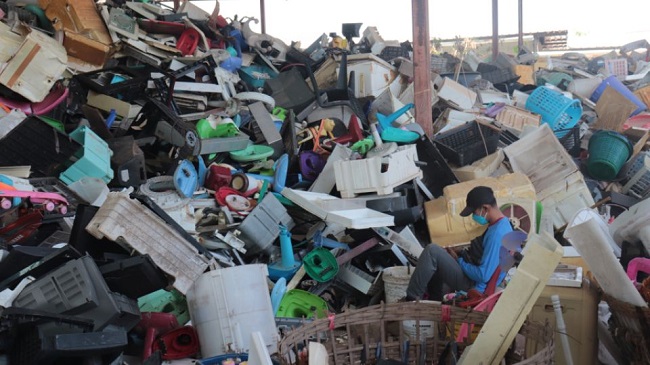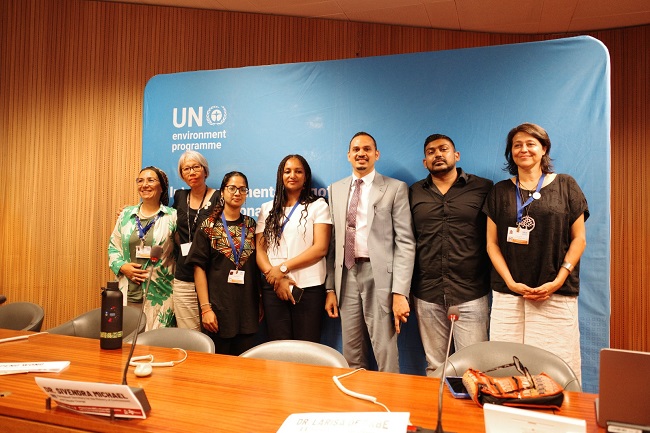Data finds high-ranking UN officials, delegates and plastic waste workers are exposed to toxic plastic chemicals including phthalates, toxic flame retardants, and other hazardous substances
Data for IPEN studies on workers’ exposures to plastic chemicals, including a cross-section of participants of high level delegates to the Plastics Treaty negotiations and plastic waste and recycling workers in Kenya and Thailand show that all study participants were exposed to a wide range of hazardous plastic chemicals.

The new data from Kenya and Treaty delegates and UN officials released at the Plastics Treaty INC-5.2 talks add to reports released by IPEN last December with data from other UN officials (“global participants”) and Thai plastic waste workers.
In all cases, all participants experienced exposures to plastic chemicals, with plastic waste workers facing overall higher levels of exposure to most chemicals than office workers.
The study, produced by IPEN members Centre for Environment, Justice and Development (CEJAD) in Kenya, Ecological Alert and Recovery – Thailand (EARTH), and Arnika in Czechia, with lab analysis by the Department of Food Analysis and Nutrition at the University of Chemistry and Technology, Prague looked at 73 substances from six groups of common toxic plastic chemicals.
The chemicals assessed included endocrine disrupting phthalates (called the everywhere and everyone chemicals), phthalate alternatives, flame retardants (OPFRs), benzotriazole UV stabilisers, polycyclic aromatic hydrocarbons (PAHs), and bisphenols and phenols (eg, BPA). All participants experienced a mixture of chemical exposures to all six types of chemicals.
“The data clearly show that we are all at risk from hazardous chemicals in everyday products, and workers who deal with plastic waste face greater risks,” said Griffins Ochieng, Executive Director of CEJAD. “Toxic plastic chemicals like the phthalate ‘everywhere and everyone chemicals” pose significant health and environmental threats. A Plastics Treaty must provide global controls that protect our communities, workers, children and families from hazardous plastic chemicals.”
“All workers deserve a safe and healthy workplace, but our study shows this is especially important for workers involved in plastic recycling and waste disposal,” said Penchom Saetang, Director of Ecological Alert and Recovery – Thailand (EARTH). “A Plastics Treaty needs to address the release of toxic chemicals throughout the life cycle of plastics, to protect workers, communities near recycling and disposal facilities, and the environment. We urge delegates to ensure that worker protections and protections for human health are at the center of the negotiations.”
IPEN members CEJAD and EARTH coordinated with Kenyan and Thai plastic recycling workers, plastic waste workers, and workers in other settings, such as office settings or other settings without occupational exposures to plastic waste to assess their exposures to chemicals in plastics.
IPEN also enlisted Plastic Treaty delegates and high-ranking UN officials to participate in the study. Participants wore wristbands that capture environmental exposures to chemicals for five days. The wristbands were analyzed at an independent lab for 73 chemicals from six chemical groups, finding that:
- All participants, including treaty delegates and plastic waste workers in Kenya and Thailand, were exposed to toxic plastic chemicals from all six chemical groups.
- Among the plastic waste workers, in Thailand, each participant was exposed to at least 21 chemicals, and in Kenya at least 30 chemicals. Across the studies in both countries, 11 chemicals were found in every wristband tested.
- Phthalates that are known endocrine disrupting chemicals (EDCs) were detected at the highest concentrations of all the chemicals.
- Plastic waste and recycling workers were exposed to more chemicals than office workers in each country. Plastic recycling workers were exposed to the highest number of chemicals in Thailand and plastic waste workers to the highest number of chemicals in Kenya.
- Polycyclic aromatic hydrocarbons (PAHs) are cancer-causing chemicals found in plastics and generated when burning plastics and other materials. Both plastic recyclers and plastic waste workers were exposed to higher concentrations and higher numbers of PAHs than office workers in each country.
- All the delegates (“global participants”) were exposed to a mixture of many chemicals; each wristband of the global participants contained at least 26 chemicals, showing exposure to all six groups of chemicals. 16 of the 73 chemicals were present in all their wristbands.
“Most plastic chemicals are not regulated by current international agreements and would not be covered by current global Conventions. Since chemicals from plastics and plastic wastes cross national boundaries, controls on hazardous chemicals should be an essential component of the
Plastics Treaty,” said Sara Brosché, IPEN Science Advisor and lead author of the study. “Plastics and plastic chemicals cross national borders without control, so national policies alone cannot solve the plastics crisis. We encourage the Plastics Treaty delegates to follow the science and develop a meaningful agreement to protect the human right to a clean, healthy and sustainable environment, including a safe and healthy working environment.”
Plastics are made with thousands of chemicals, mostly petrochemicals derived from fossil fuels. Many plastic chemicals are known to be hazardous to our health and/or the environment, and many more that have little or no hazard information. Hazardous chemicals are released throughout the life cycle of plastics, including when plastic wastes are handled during waste processing or recycling. Recycling plastic also passes toxic chemicals on, poisoning the “circular” economy and creating ongoing risks to health and the environment.
Volker Türk, United Nations High Commissioner for Human Rights, said: Plastics and their byproducts are made of chemicals that are seriously harmful to people and the environment. They are present in every ecosystem on the planet, accumulating in food chains, contaminating water, soil, and air, and releasing hazardous substances into the environment. Most plastics derive from fossil fuels and emit greenhouse gases throughout their life cycle, exacerbating the multiple planetary crises.
“Each stage of the plastics life cycle from extraction through disposal, adversely impacts human rights, including the rights to health and to a clean, healthy and sustainable environment. The negotiation of a new treaty on plastic pollution is a unique opportunity to advance human rights and protect our planet. We must seize this moment and deploy human rights solutions to stop the senseless destruction caused by plastic pollution.”
Luis Vayas Valdivieso, Ambassador of Ecuador to the United Kingdom, said: “Chair of the INC to develop an international legally binding instrument on plastic pollution. Plastics and the chemicals used to make them surround us daily. As the INC Chair, I participated in this study to learn more about them. As we look ahead, we must succeed in the Plastics Treaty negotiations, for the well-being of our planet and human health.
Magnus Heunicke, Minister for the Environment, Denmark, said: Plastic pollution is a global challenge to both the environment and human health and the results underline the need for global action on plastic chemicals.
Camila Zepeda Lizama, Head of the Coordination Unit for International Affairs, Ministry of Environment and Natural Resources, Mexico, said: We are discouraged to find from the IPEN study that toxic plastic chemicals are trespassing into our bodies every day. Phthalates, for example, are ‘everywhere and everyone’ chemicals that are linked to serious health concerns like infertility and cancer. A Plastics Treaty must protect human health and provide global controls on toxic chemicals throughout the plastics life cycle.
Ms. Keima Gardiner, Waste Management Specialist, Republic of Trinidad C Tobago, said: It takes a certain level of ambition to cultivate a seemingly impossible future, and as knowledge increases so do expectations. Participation in this study not only brought to the fore the hidden chemicals and potential threats in plastics from routine exposure but more so underscored the urgent need to catalyse the development of a purposeful global Plastics Treaty that addresses plastic pollution and reflects our collective will to amplify action to protect human health and the environment, for those among us and the generations to come.
Dr. Maria Neira, Director, Environment, Climate Change and Health, World Health Organisation, said: Exposure to chemicals used in plastics that have long been regulated, like certain phthalates, is a public health concern. These chemicals are known to disrupt our bodies’ natural hormones and demonstrate the urgent need for strong global protections for our health and the environment. The Plastics Treaty should be a key global agreement to protect human health and future generations.









